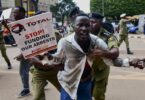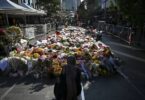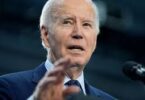Anthony Ruggiero
The World Health Organization declared that COVID-19 had become a pandemic on March 11, 2020. The announcement arrived when there were already 118,000 confirmed cases in 114 countries and more than 4,200 deaths. It came so late because WHO, under Director-General Tedros Adhanom Ghebreyesus, deferred to Beijing as the virus emerged.
The death toll in the United States alone could surpass 1 million, yet President Joe Biden has given up on reforming WHO, which still has not conducted a credible investigation of the pandemic’s origins and is not prepared to challenge Beijing if it hides another outbreak. Last year, Ghebreyesus ran unopposed for a second five-year term as WHO chief because the Biden administration did not recruit another candidate. Yet without change at the top, WHO will remain broken.
In the pivotal month of January 2020, when there may still have been a chance to curtail the pandemic, Ghebreyesus and WHO consistently extolled the Chinese government for its handling of the outbreak. After meeting with President and Chinese Communist Party leader Xi Jinping, Ghebreyesus insisted , “I will praise China again and again because its actions actually help in reducing the spread of coronavirus to other countries.”
Ghebreyesus’s subordinates privately voiced a very different view. The Associated Press later discovered that while Ghebreyesus was celebrating Beijing’s commitment to transparency, senior WHO officials said China was keeping them in the dark. One of them said at an internal meeting, “We’re going on very minimal information. It’s clearly not enough for you to do proper planning.” At another meeting, the top WHO official in China said, “We’re currently at the stage where yes, they’re giving it to us 15 minutes before it appears on [China Central Television].”
In 2020, American experts wrote off as fantasy the idea that the virus escaped from a lab in Wuhan. By the time Biden took office, the U.S. Intelligence Community was approaching the view that the lab leak hypothesis was at least as credible as the idea that the virus spread from a meat market in Wuhan, the city that happens to be home to laboratories experimenting with coronaviruses.
In response, Biden asked the IC to “redouble their efforts to collect and analyze information that could bring us closer to a definitive conclusion” on the origin of the virus. That was May 2021, and almost a year later, we are no closer to an answer. WHO sent a team of investigators to look for the cause of the outbreak, but the CCP imposed such tight restraints that even Ghebreyesus had to disavow the final report.
At times, the administration has hinted that it may regret letting Ghebreyesus run unopposed. The director-general is trying to increase his discretionary budget to free himself from oversight by WHO’s largest donors, including the U.S. Instead, the Biden administration supports the creation of a fund housed at the World Bank to “make immediate investments to prevent and prepare for future health crises.” While some of the money would support WHO projects, the proposal is an acknowledgment that Ghebreyesus alone should not be entrusted with global public health efforts.
The Biden administration boasted last month that it convinced the WHO executive board to strengthen the legally binding International Health Regulations, which were last updated in 2005 following Beijing’s efforts to hide the 2003 SARS1 outbreak. WHO coordinates the implementation of the regulations. The administration said these new regulations will “enhance the world’s ability to prevent, detect, and rapidly respond to infectious disease outbreaks in the future.” Yet the administration cannot explain how it will secure Beijing’s approval for changes that impose precisely the kind of transparency the CCP cannot abide.
The White House has also been remiss in terms of starting a public discussion about the risks of laboratory experiments that involve the modification of viruses, potentially making them more lethal and infectious. The pandemic exposed the extent of dangerous and poorly supervised lab activities. Even if they were not the cause of the pandemic, we must discuss whether the risks outweigh the benefits. The White House also needs to drive a discussion about disease surveillance programs, in which scientists visit potential animal reservoirs to study viruses that may spread to humans — an activity that may accelerate a pandemic.
Biden rejected his predecessor’s withdrawal from WHO and pledged to strengthen and reform the organization from within. More than a year into his presidency, the world is ill-prepared for the next pandemic, and there are no guardrails to prevent China from hiding another outbreak.
Anthony Ruggiero is a senior fellow at the Foundation for Defense of Democracies. He previously served in the U.S. government for more than 19 years, most recently as senior director for counterproliferation and biodefense on the U.S. National Security Council. Follow Anthony on Twitter @NatSecAnthony. FDD is a Washington, D.C.-based, nonpartisan research institute focusing on national security and foreign policy.
Courtesy: (FDD)






